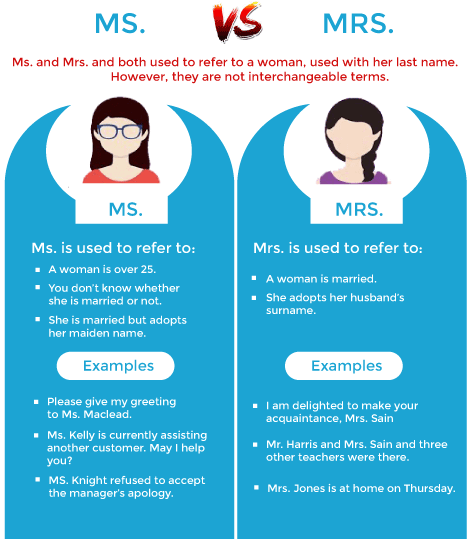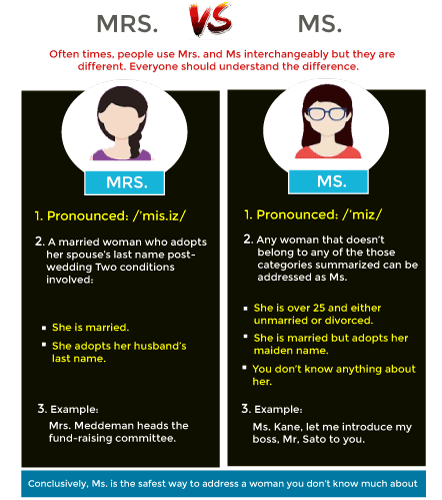Difference between Mrs. and Ms.
The corporate label, social merits, and personal preferences determine how titles are used for men and women. A guy always takes “Mr” irrespective of marital status. But it is recommended to inquire before talking about a lady.
We will examine the concept of each title for official purposes. Then we will examine how you might misstep and prevent them.

How to address men and children
Because this is the simplest category, let’s start here.
When addressing a guy, always say “Mr,” whether he is engaged or not. Males don’t have to concern themselves with how matrimony changes their approach.
Some call young boys “Master,” but for adults, it’s never used. If you invite an eight-year-old boy to a party like a birthday celebration, it’s all right to say “Master [first name].”
Addressing males as ‘Mister,’ or ‘Mr,’ is fine. When using it as a title, still use the acronym “Mr.” (U.S.).
Whenever it comes to women/girls, we’re experiencing a few strange times. The contemporary is usually a moment in which we have thought that it is far more evolved than the past.
There are still some societal repercussions to be identified from these less clear kinds of violence. These disparities are a manifestation of how we use speech in the past and now.
It is confusing in polite language. The words to address, or honors, relate to the social standing of women based on how they are employed: Lady, Miss, Ms.
The proper use of “Miss.”
“Miss” is often used to treat an unmarried lady with due respect along with the Name. It can be used to acknowledge her without a surname. The right way for this title to be said is [Miss] [Name].
You’ll also find the title “Miss Perfect” or “Miss Manners” for use as teasing or a compliment to the qualities of a woman’s personality.
Samples
- Miss Myers, is possible, feel free to call our department.
- Pardon me, Miss, but something has been left aside.
- She’s Miss Know-it-all, but unknowing.

Configuration in which “Miss” is used
It is preferable to use “Miss” in a formal environment before the last name of an unmarried lady (surname).
Characteristics of effective contexts include commercial contacts, professionalism with business partners or employees, approaching a person in an office, approaching a person not personally known, etc.
The usage of ‘Miss’ before an unmarried lady’s first (given) surname is less professional. It should only happen if you are allowed to.
Use “Miss” when greeting a stranger whose surname you don’t know.
You can grab her attention by stating. E.g., if you meet a woman (of any age) on the sidewalk who drops her scarf, “Sorry, Miss, Is this yours?
The “Mrs” use:
‘Mrs.’ is the term for addressing a married lady preceding the Name. It is like “Miss” since it is used the most with a female’s surname. It identifies the women from the first and last name of the husband (Mrs. Donald Smith), but this tradition has been regarded as archaic. Some ladies might even be offended; thus, it is preferable to avoid it.
This nickname is [Missus] spoken. In reality, the title of “Missis,” “Missus,” or “Mizzus” is often included in the dialog to give an accurate sign of how people pronounce a personality.
Samples
- Jones, down the street, owns the floral business.
- Annette, you are a great lady.
- Later tonight, I’ll ask the Missus what she thought of supper.

Following scenarios to use “Mrs”.
You will use ‘Mrs’ before a married wife’s last Name to addressing her in a formal setting, like in a corporate or professional environment.
Like “Miss,” before an engaged woman’s first surname, you can also use “Mrs,” but you should wait until you are allowed to do so.
But you’ll seldom see ‘Mrs.’ or ‘Missus’ dosed, without a nickname or Name after it. It is generally used alone, as a friend requests another acquaintance: “You and your missus are joining us at dinner?” When it’s used on its own. It is another way “Mrs.” distinguishes “Miss.”
The proper use of “Ms.”
If you’re not sure of the marriage status of a lady and address her in writing, “Ms.” is the appropriate title to use. Consider the reverse of ‘Mr.’ used to refer to a guy, irrespective of his marital status. The right way to say this is [Miz] (rhymes with “fizz”).
Samples
- Jenner, my dear
- Lyle is Belleview High School’s newest administrator.
You are to use “Ms” in these settings.
As before stated: “Ms.” is the ideal word for women where married status is not known and for informal information with respect. Many editorialists and journalists will use this word to hide their tracks if “Miss” or “Mrs.”
Like “Mrs.,” it is not customary to use “Ms.” as an autonomous term
For women, you used the feminine version “Mistress,” while you addressed males as “Mister,” which does not disclose whether a lady was hitched. We do not use this phrase anymore and have developed to identify relationship status in various ways.
“Mistress” defines a lady who has a married guy in the U.S. today, so be careful!
Nowadays, for young girls or unmarried ladies, we use “Miss.” And “Mrs.” means “missus” diminutive and references to married wives.
“Ms.” came into being in the 1950s when women tried to distinguish themselves from their marriage status and became important in the 1970s. Nowadays, irrespective of gender, it is more usual to call a lady ‘Ms.’
“Ms” is to be used.
You can hardly go wrong when you talk to a woman like “Ms.” As women nowadays don’t like to consider their relationship status when addressing them. ‘Ms’ is safer than ‘Miss’ or ‘Mrs.’ regardless of their relationship status.
“Mrs” should be used.
“Mrs” to be used for married people, some widowed or separated females still call themselves “Mrs.” You cannot suppose that someone who uses the term “Mrs” has a husband. But, they still wish to be called “Mrs.” It might upset them, especially for elderly widows, if you greeted them as “Ms.”

In editorial and writing, several newspapers have recently used the woman’s first and last title without some of the three titles (“Miss”, “Mrs.”, or “Ms.). In conversation, but it is not permissible since “Miss,” “Mrs,” and “Ms” are still appropriate (as long as it is the correct one).
